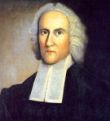Last week I posted a blog on the sins of the father’s visited on the children. In that blog I made the point that family sins have serious and lasting consequences. The following article illustrates this in a contrast between a godly home and an ungodly home over many generations. The information in this article is gleaned from a book published in 1900 by A. E. Winship (Jukes-Edwards: A Study in Education and Heredity).

In 1874 Richard L. Dugdale was employed by the New York Prison Commission to visit the state prisons. As he visited he was surprised to find criminals in six different prisons whose relatives were mostly criminals or paupers, and the more surprised to discover that these six criminals were all descended from the same family.
This led Mr. Dugdale to study their relatives, living and dead. He studied the court and prison records, reports of town poorhouses, and the testimony of old neighbors and employers. He learned the details of 540 descendants of “Max” (the name given to the patriarch born about 1720) in five generations. He learned the exact facts about 169 who married into the family. He traced others linked to the family bringing the number up to 1,200 persons of the family of the Jukes (Juke was not the real name of the family). A. E. Winship described the family like this;
The almost universal traits of the family were idleness, ignorance, and vulgarity. They would not work, they could not be made to study, and they loved vulgarity…. It is very difficult to find anyone who is honest and industrious, pure and prosperous.

In 1897 A. E. Winship was asked by a scholarly organization to prepare a paper on Jonathan Edwards. In the course of his studies Winship discovered the descendants of Edwards presided over the New York Prison Commission when it employed Mr. Dugdale to make a study of the Jukes. This led Winship to a study in contrast between Jukes and Edwards. Jonathan Edwards’ great-great-grandfather, Richard Edwards, who went from Wales to London about 1580, was a clergyman. Among the first men of the Edwards family to come to the colonies in New England was William, a son of this clergyman, born about 1620, who came to Hartford, where his son Richard, was born in 1647.
Jukes
- 310 of the 1,200 were professional paupers—more than one in four.
- 300 of the 1,200—one in four—died in infancy from lack of good care and good conditions.
- 50 women who lived lives of notorious debauchery.
- 400 men and women were physically wrecked early by their own wickedness.
- 7 were murderers.
- 60 were habitual thieves who spent on the average twelve years each in lawlessness.
- 130 criminals who were convicted more or less often of crime.
Edwards
- 1 U.S. Vice-President (Aaron Burr)
- 3 U.S. Senators
- 3 governors
- 3 mayors
- 13 college presidents
- 30 judges
- 65 professors
- 80 public office holders
- 100 lawyers
- 100 missionaries, pastors and theologians.

My father’s family are associated with the Army in many ways but my Mother’s family are associated with Church Missionary work. Our present Moderator of our own Free Presbyterian Denomination, the Rev. John Greer, is related to my Mother’s family. I’m a Christian in an active job and maybe these two family histories have combined to enable me to be a Christian Soldier, in the Lord’s Army. Just a thought. I’d always have loved to preach from the pulpit but never got the opportunity – maybe some day.
Thanks Robert, interesting history. You are more useful in the factory or the office if that is your calling….one of the doctrines recovered in the Protestant Reformation is the Priesthood of all believers—we are all kings and priests onto God.